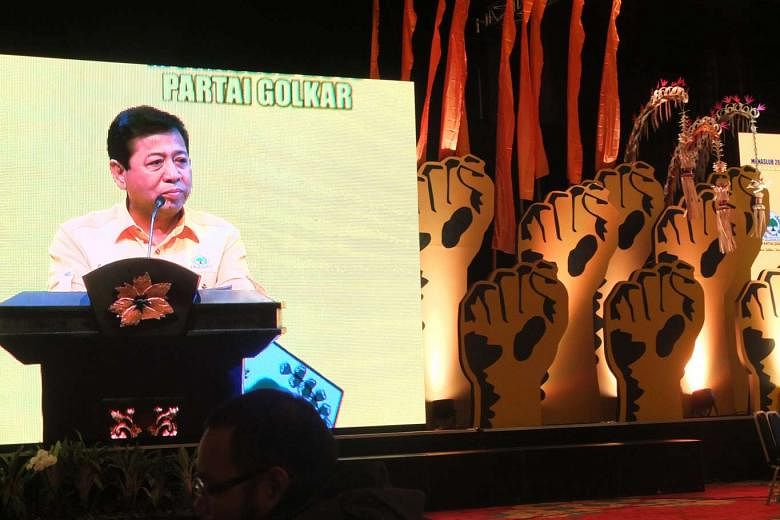In its editorial on May 18, the Jakarta Post says the election shows that the party now lacks credible figures who could build its image and help it regain public confidence in both regional and national elections.
Far from its much-heralded theme of reconciliation, the Golkar Party congress in the Bali resort area of Nusa Dua has from the beginning displayed a revival of old animosity between warring party factions, as evidenced by mudslinging and trading of punches ahead of the election for the party's chief post.
In yet another show of farce, and force, the party elite on Tuesday voted for former House of Representatives speaker Setya Novanto as the chairman for the coming five years, after on Monday naming outgoing chairman Aburizal Bakrie the powerful chief patron.
Not only the public at large, but perhaps also Golkar grass root supporters will find it hard to fathom that such a controversial figure as Mr Setya is entrusted to lead the country's second-largest party.
He resigned as the House speaker last December just after most members of the legislative body's ethics council had found him guilty of medium or gross violations of the House's code of ethics for his alleged attempt to broker a contract extension for gold and copper mining company PT Freeport Indonesia.
A number of lawmakers who later were convicted of corruption have also named Mr Setya in their testimonies, although the Corruption Eradication Commission (KPK) has so far found no evidence to ensnare the businessman-cum-politician.
Common sense would lead us to the conclusion that Mr Setya is a liability for Golkar due to his track record. His tainted reputation could plunge Golkar deeper into the deficit of public trust.
Or, if the politics of criminalisation, as some politicians suggested, was exercised to stymie the opposition, Golkar under Mr Setya would come under constant threat of being held hostage by his legal cases.
Mr Setya's rise to the Golkar throne, therefore, reflects not only his mastery of the art of survival, but also his ability to convince power brokers, both inside and outside of Golkar, that he serves their interests.
But would Golkar have evaded the same conundrum had a candidate other than Mr Setya won the party's chairmanship? Not necessarily.
As the just concluded Golkar succession has demonstrated, the party lacks credible figures that could build its image anew and help it regain public confidence in both regional and national elections.
Candidates for the party's chief post were chosen not through a selection mechanism that ensured their close connection with grass root members, but simply by the blessing of party leaders.
Golkar's party in Bali is over. It, however, remains to be seen whether the reconciliatory congress will really restore unity in the party, even though Mr Setya has promised to give his contenders respectable posts on the new board of executives.
For President Joko Widodo, however, a Setya-led Golkar would be a strategic partner in realising government programs, which, like it or not, are a manifestation of Mr Joko's campaign platform.
With political stability far more secure following Golkar's jump to the ruling coalition from the opposition force, there is no excuse for the government to not expedite the execution of its development plans.
--------------------------------------
The Jakarta Post is a member of The Straits Times' media partner Asia News Network, an alliance of 22 newspapers.

